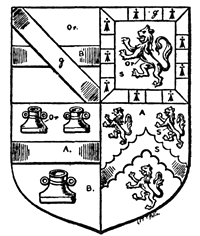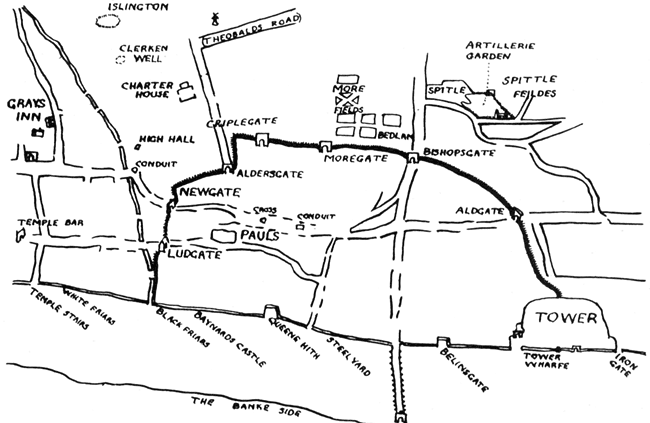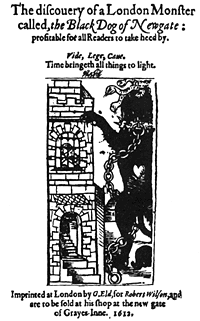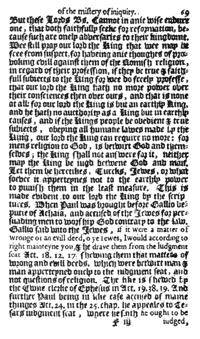Thomas Helwys of Gray's Inn and of Broxtowe Hall, Nottingham.

Thomas Helwys in 1590 was the head of a family known in the lower Trent valley for more than two and a half centuries. His great-grandfather, Robert, died at Askham where his grandfather farmed: a coat of arms with four quarters, recorded in the St. George's Visitation of Notts., 1569, shows how well the family had married. Edmund, eldest son of William, took a lease of Broxtowe Hall in the parish of Bilborough, close to Nottingham. Edmund and his wife died, leaving five children all under age, though Thomas was executor.
The head of such a family deserved the best training possible. Universities were specializing too much in theology. Just adjoining London, on the Westminster side, were the four Inns of Court, intended chiefly for the profession of the law, but also for the education of the sons of the nobility and gentry. The largest and most fashionable was Gray's Inn. It had educated lawyers like Thomas Cromwell and Francis Rodes, one of the judges of Mary Queen of Scots. Among its dignitaries at this time were William Burghley, High Treasurer of England, canon Bancroft, Lancelot Andrews of Winchester, Several young Cecils and Hattons were studying here, with seventeen scions of county families from the Helwys country. Geoffrey, brother of Edmund, was a merchant in the city, near enough to keep an eye on his nephew: so on 29 January 1592/93
Thomas was entered, together with his friend Edward Stanhope, whose father was supervisor of Edmund's will. The entries that year were 104, highwater mark.
The Inn faced east, on a lane named after it. Its buildings were on the north, east, and south of the present Gray's Inn Square. The Hall served for lectures, moots or discussions, and meals; and the domestic offices extended along the southern boundary. East of it was the Chapel, where regular attendance was expected; a preacher and a reader maintained the services, yet the old leaven was not worked out, and only 13 months earlier, a Seminary Priest had been executed to Gray's Inn Fields. The east face was a row of buildings for residence, pierced by the main gate; to the north was a large block, lower gallery of one storey, upper gallery with several storeys. Within the wall that surrounded the Inn, other residence-blocks were rising, built by members on leases for life, with reversion to the Society; and on similar terms, timber was constantly being replaced by stone. Even so, members were packed very close, and might not always choose their bedfellows. So the field to the south was being taken in, and a new passage being arranged, with a new gate into Holbourne. Both gates were closed at 9.30, and opened at 4.30 a.m.
The course of study was ample, and an intelligent young man might readily qualify himself to play a part in his county as a justice of the Peace; while should he decide to devote himself to the profession of the law, every opportunity was given. A recent reform had improved the public Lectures; and thrice a week there were Moots, when some abstract principle was discussed, or an imaginary case was pleaded, in the old Norman French which still survived at the Queen's courts.
Whatever men held offices year by year, the man who really counted was Francis Bacon, a Bencher for seven years. He had speculated in a building within the Inn, and was now laying out the Walks to the north, in a style described in one of his Essays.
Social life was intense. Thrice a day meals were served in hall, at a cost of vjs. per week. There was a series of tables, and an etiquette of seating; the food was brought by junior members who thus paid their way; it often included oysters, when the usual pottell of Claret wine was doubled. At mealtime, as at lecture-time, costume was regulated; spurs, boots and hats were forbidden, caps were enjoined. Frequent orders had to be made, to sit or wait for service without crowding the carver, not to break potts, throw bread or meat, pitch oyster shells. Within the walls there was a bowling green. A student leaving the Inn must wear his gown. There were however posterns where no porter kept watch, George
Fulwood had his private exit in to his family's garden to the south; and when Helwys and young Camden, not yet the staid antiquary, wanted to see a main of cocks fight in the pit north of the road to Theobalds, gowns were probably doffed.
Within three weeks of Helwys entering, Elizabeth convened her eighth parliament. Francis Bacon sat, no longer for Taunton or the obscure Liverpool, but for the county of Middlesex within which Gray's Inn stood. It may be expected how the newcomers would go to Westminster, and canvass the proceedings there at every mess in hall. For at the outset, when the usual request was made by the Commons for liberty of speech, a very Tudor-like reply was made:- Your privilege is "not to speak every one what he listeth, or what cometh in his brain to utter that; but your privilege is, Aye, or No. Wherefore, Mr. Speaker, if you perceive any idle heads, that will not stick to hazard their own estates, which will meddle with reforming the Church and transforming the Commonwealth, and do exhibit any bills to such purpose - Receive them not, until they be viewed and considered by those who it is fitter should consider of such things and can better judge of them." This was strong meat, the Commons objected and within a week the Speaker had to reiterate her words:- "She wondered that any should be of so high commandment to attempt a thing contrary to that which she hath so expressly forbidden", and she was highly displeased. This was the policy of her father; she alone could initiate ecclesiastical legislation, just as she alone could initiate money measures. And she was not backward in this, for two bills were offered, to deal with extremists on either hand.

London 1620 Simplified from a map in the Guildhall Library.
One was aimed at Popish Recusants, because of a plot recently discovered; if they would not conform, they must go home and never stir beyond five miles from home, reporting themselves; if they had no home, or were below a certain level of wealth, they were banished. The other, which concerns us, was to punish absence from public worship for a month, or attendance at conventicles.
Now this Conventicle Bill would excite peculiar interest at Gray's Inn. "In the loathsome gaol of Newgate," half a mile east, across the Fleet river, lay Henry Barrow, a Gray's Inn man, recently condemned to death for "publishing and dispersing seditious books" which explained his dislike of the constitution of the Church. He and his friend Greenwood were bones of contention between two parties on the Council, the lay and the clerical. He wrote on the fourth of April to a lady, apparently his cousin Agnes, sister-in-law to Francis Bacon, how on the 24th of March they were brought out of limbo and ready to be bound to the cart, when Elizabeth's reprieve arrived: how on the 31st they were secretly conveyed to the place of execution and were tied by the neck to the tree, when a second reprieve arrived: how this was applauded by the people as they returned from Tyburn past the new gate of Gray's to the miserable gaol. He pleaded that her Honour would speak to her Majesty for a pardon. A contest ensued between Cecil the Lord Treasurer and Whitgift the Archbishop. When the Bill came to the House of Commons, it was recognized as primarily against Barrowists and Brownists, but capable of being stretched. There was great opposition; Sir Walter Ralegh in particular objected to the proposal to judge opinions rather than deeds. He pointed out the difficulties in the way of enforcing the bill, asking who would pay the cost of transporting two or three thousand Brownists, where they were to be sent, who would maintain their wives and children. Early next morning Barrowe and Greenwood were hanged, and it was plainly said that their execution proceeded of the malice of the bishops, to spite the Nether House, which procured them much hatred of the common people affected that way. The lesson failed; the Bill was altered in the sense Ralegh desired, and parliament was dissolved. Elizabeth, who always shirked responsibility for executing any one, found that clergy and nobles alike disapproved: "Alas!" said she, "shall we put the servants of God to death?" And no more were executed. And therefore the Conventicle Bill was amended; it finally provided that a man should go to prison for three months to consider; then if he refused to attend public worship on formal demand being made, he was banished for life. This is the Act under which apparently Helwys suffered twenty years later, and under which Bunyan was destined to spend twelve years in Bedford jail.

Now Helwys had a personal interest even at this time in the proceedings against Barrowe. The head and front of his offence, in the eyes of Whitgift, was that he objected to an ecclesiastical dignitary holding civil office, and declared any such miserable compound to be the Beast spoken of in the Revelation. Many students of the Bible thought and spoke along this line; and Helwys' father, Edmund, had published a pamphlet expounding Revelation xii. The son was sure to note both the fate of the individual Gray's Inn man, and the parliamentary proceedings that interlocked with it.
In that same parliament, Bacon gave deep offence by his objection to new taxes that were proposed, and this hindered his promotion to be attorney-general. He sought to regain ground at court, and Whitgift was entered as a member of Gray's Inn. Soon special revelries were proposed, and notable guests were invited. On Innocents' Day there was dancing and revelling with gentle-women; and after such sports a Comedy of Errors (like to Plautus his Menechmus) was played by the players. The climax was the masque performed by the "Duke of High Holborn" and his followers, before the Queen. She was pleased to say that Gray's Inn did always study for some sports to present unto her. The entertainment was repeated next Shrovetide, and Helwys would pay up his iiijs. with loyalty. Such revels are fitly commemorated to-day, when in the place of honour above the dais is a portrait of the Queen, with one of Burghley below, and Bacon on the same wall.
Helwys kept about a dozen terms; his cousin Thomas, son of his uncle Thomas at Habblesthorpe and Leverton, entered at Staple Inn before he went down, and came on to Gray's Inn as one of the waiters, of the third table. And the connection was kept up by another cousin, Henry, son of Geoffrey the city merchant, who was rich enough before the century ended to enter him on ordinary terms.
But Helwys had a duty to his family in the country. In December 1595 he married Joan Ashmore, and brought her to Broxtowe Hall, settling down to the life of a country gentleman. His hand may be seen, certifying a terrier of the parish, which had been annexed to Bilborough. There was property to be watched, now that he had assumed his place. The family had fishing rights in the river Idle, whose meandering waters fed the fens and isolated the Isle of Anxholme. A proposal was made to drain the fens; so all parties had to consider their rights, and what compensation was offered for the changes. Now this sort of work had been tried on both sides of the Thames, by an engineer from Italy, known often as Jacobus Acontius. He had come with a great reputation as an inventor, and had ventured to intervene when some Dutch Anabaptists were arrested and sentenced, urging that doctrine not essential to salvation should not be imposed on Christians. He had a turn for philosophy, and his treatises had evidently influenced Bacon, who popularised his ideas on Method. Acontius had also published at Basel in Latin and in French a remarkable book on the Stratagems of Satan, which was in reality a very valuable plea for religious liberty. Four editions had been printed before Helwys went to London, and he may have seen both these important works in the library of the Middle Temple, where they still stand. He certainly now had two points of contact with the versatile Italian.
His life at Broxtowe was for a dozen years without event. When King James made his stately progress from Edinburgh to London in 1603, knighting scores of people by the way, Helwys did not claim his right, either at Worksop or at Newark. His cousin Gervase did however receive the accolade at Theobalds, a mansion of the Cecils. A neighbour, Edwin Sandys, a son of a recent archbishop of York, was knighted at Charterhouse; he at once took a prominent place in parliament, and must be considered presently.
The king soon antagonized parliament by his autocratic dealing, both in civil and in ecclesiastical matters. What parliament was to fight out on these lines for a generation and more. Helwys had to decide in his county arena. And here he had to reckon that the North was governed by a Council on which he had just one friend, supervisor of his father's will, Sir Edward Stanhope; while there was a High Commission to superintend the province of York. Now what James had promised after the Hampton Court Conference included, that the High Commission should be smaller, with men of better quality; that bishops should exercise their powers in concert with other grave ministers; that there should be fewer men holding two benefices; that learned men be placed and maintained in more places. All these things were granted at the request of the Puritans - a fact far too often ignored. But James had not reckoned on the opposition of the bishops of the patrons of livings, of the impropriators of tithes. And thus he had aroused hostility in most diverse quarters. When he came to feel this, he failed to fulfil his promises, and even to make any serious effort that way.
Many men in this district eagerly awaited these reforms; for instance, a new family which had struck root in the county, owing to the nepotism of archbishop Sandys. His son Edwin had been at the Middle Temple, just senior to Helwys, and had sat in the 1593 parliament; he had secured from the estates of the archbishopric four leases which caused him to be reckoned with locally. He had travelled on the continent, and had written a Survey of the State of Religion. All that dealt with the Roman Catholics was surreptitiously published in 1605, and in the excitement caused by the Gunpowder Plot, three editions were rapidly sold before Sandys could get the High Commission to burn it publicly. Indeed it not only surveyed, but had some surprising propositions. He regarded the divided state of Christendom as a scandal, traced it to the exaggerated importance of uniformity of doctrine, blamed the council of Trent and Calvin for this, and trenchantly criticized the doctrines of Calvin. He would be content to have fellowship with all who accepted the general foundations of religion, as summed up in the Apostles' Creed: "for all other questions, it should be lawful for each man so to beleeve as hee found cause." Edwin's brother Samuel had secured six cheap leases in the same way, including the manor and palace of Scrooby, which alone was reckoned by their father as worth £30,000. This was an important Post for horses on the great North Road; the actual postmaster was William Brewster, who succeeded his father and his grandfather, at xxd. the day.
Helwys was in touch with a few ministers, such as Richard Bernard the vicar of Worksop, andjohn Smyth, a Sturton lad from the Habblesthorpe district of his uncle Thomas. Smyth had been a fellow of Christ's College at Cambridge city preacher at Lincoln, but was now at Gainsborough. He had thought along the lines of Edmund Helwys, and concluded that the whole system of the Church of England was anti-christian; that he must start anew. So he renounced his ordination, gathered others of like mind, and organized them into the "Church of Gainsborough", drawing up a simple Covenant to walk in all the Lords's ways made known or to be made known. Within a year he had enrolled adherents up the Trent valley, as far as Basford and Broxtowe, including Thomas Helwys.

A Page of letterpress
This break away from the Church of England startled may people, and Mr. A. S. wrote to Helwys to prove that this was a true Church, her ministry a true ministry. Ecclesiastical questions were not quite in Helwys' line, and he did not reply at once, so that A. S. assumed he had been unanswerable and wrote as much. This second letter Helwys sent to Smyth, who returned a long and careful answer, bristling with scripture proofs.
Other people were deeply perplexed, so that Sir William Bowes, who had married Isabel Wray of Glentworth, just across the Trent, arranged a conference in their home at Coventry. Helwys took Smyth and Bernard, and there was a long discussion, which bore unexpected fruit within a score of years. On the return, Smyth seems to have fallen ill, and whether then or at some other time, Helwys took him in and nursed him at Broxtowe. Little knots of adherents now began to hold meetings for worship, some at Broxtowe, some at Scrooby. And another minister was found to help Smyth, John Robinson, also of Sturton, and recently working at Norwich.
Such defiance of the Conventicle Act could not be tolerated, and a new High Commission set to work. By July 1607, Joan Helwys was arrested; as she declined to answer questions, she was sent to York Castle. If we wonder why they did not arrest her husband, the answer is that he was not within reach. He could see that life in England was impossible for such as them, and he was preparing a wholesale exodus. Across the sea lay the Netherlands, and conditions there were being examined, for it was vaguely known that the liberty denied at home was granted there. At Antwerp had been printed English Testaments and Bibles, till Thomas Cromwell had given the king's licence. At Middelburg had been printed one of Barrow's books, which won over the English chaplain, who threw up his post, joined Barrow's church in London and took most of it to Amsterdam.
This city was pre-eminently a refuge for the distressed. For thirty years all Protestants had been free to worship on their own premises. If ever a protest was made, Burgomaster C. P. de Hooft had been earnest to uphold the ancient custom of the city, saying they should be careful not to invade the liberty of others almost before they had recovered their own, that they should disturb no one on account of his conscience, that no magistrate had authority in matters of faith. Such were the speeches he was making for ten years to come. And not only were there many Dutch Anabaptists or Mennonites of various shades dwelling there, but many refugee English had already found homes and were worshipping as God led them.
A representative went over to verify this attractive picture, and as it was acknowledged later that if any brought oars, Helwys brought sails, it was probably he himself, who thus escaped arrest along with his wife. He secured a spacious block of premises of the river Amstel, with a courtyard extending to the city ramparts. It belonged to Jan Munter, who had used it to bake biscuit for the forty East Indiamen which brought every year spice, silk, jewels and gold, to be sold to all Christendom. The bake-house could be adapted to provide common rooms and family lodgings: it would be like resuming the life at Gray's Inn, with the presence of many wives and children. To this refuge, after striking adventures, he brought scores of emigrants from a score of villages by July 1608; and it was destined to be his home for four years. He had no other, for the English authorities allowed emigration only by licence, and strongly objected to money being taken out of the realm: therefore Broxtowe Hall was seized by the king, who within two years granted the lease to other holders.
And of his family we know nothing for certain, beyond the sad note three years later, have we not neglected our wives, our children, and all we had? One of the parties that kept arriving included Jervase Neville of Scrooby, who had been in prison at York Castle along with Joan Helwys; evidently in his case the penalty of the Conventicle Act was enforced, and he had been banished for life. In England the emigrants had been occupied in agriculture, but in Amsterdam they had to take up other occupations. From the city registers we find that they engaged in laying bricks, carpentering, painting, tinning, working in bombazine, damask, fustian, fur, and embroidery.
They had come to foster the inner life, and a letter of Helwys on 26 September describes briefly how they worshipped, and how they differed from the earlier colony of Londoners in Amsterdam. Of course as both were Separatists, there was much intercourse; it proved that when he had been at Gray's Inn, some of them had been in Newgate prison, half a mile away, along with a weaver and a tailor in Gray's Inn Lane. Presently a third church crystallized around John Robinson, consisting chiefly of his followers from East Anglia, though members re-arranged themselves a good deal. The differences of these three churches were keenly debated, till Robinson took his group away to Leyden.
